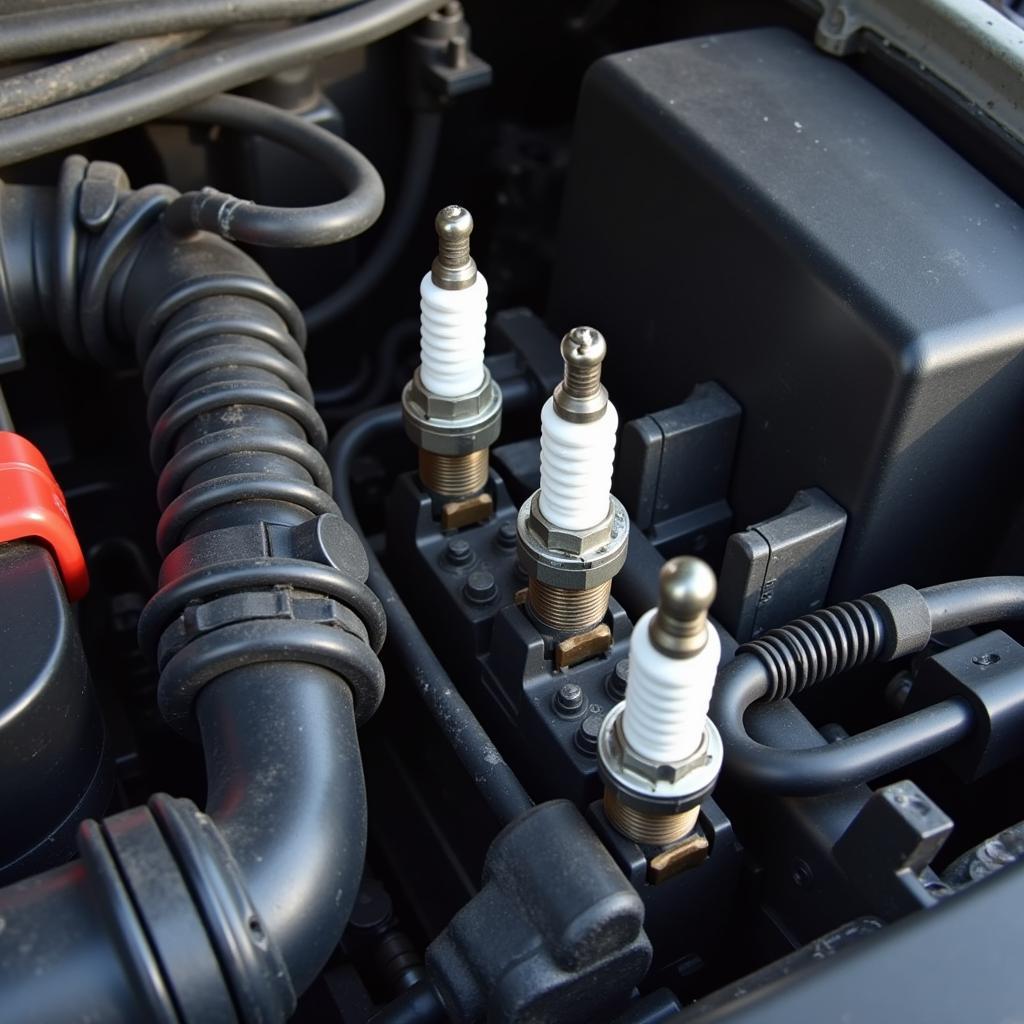Your cart is currently empty!

Understanding and Fixing the P0300 Engine Code in Your VW
The dreaded p0300 engine code vw. It’s a common issue for Volkswagen owners, and it can be a real headache to diagnose and fix. This comprehensive guide will walk you through everything you need to know about the P0300 code, its causes, symptoms, and most importantly, how to fix it yourself, or discuss the issue intelligently with your mechanic.
The P0300 code indicates a random misfire. Unlike other misfire codes (like P0301, P0302, etc., which pinpoint a specific cylinder), P0300 means the misfire is happening randomly across multiple cylinders, making the diagnosis a bit more challenging. But don’t worry, we’ll break it down. p0300 code 2002 vw passat offers helpful information specifically for Passat owners experiencing this issue.
What Causes a P0300 Engine Code in a VW?
A myriad of problems can cause the P0300 code. Everything from faulty spark plugs and worn ignition coils to vacuum leaks and fuel system issues can be the culprit. Let’s look at the most common causes in more detail:
- Spark Plugs: Worn-out spark plugs are a frequent cause of misfires. Over time, the electrodes wear down, making it harder for the spark to ignite the air-fuel mixture.
- Ignition Coils: A failing ignition coil can prevent the spark plug from firing properly, leading to a misfire.
- Vacuum Leaks: Leaks in the vacuum system can disrupt the air-fuel ratio, causing the engine to misfire.
- Fuel Injectors: Clogged or malfunctioning fuel injectors can disrupt the fuel delivery to the cylinders, resulting in a misfire.
- Fuel Pump: A weak fuel pump may not be able to supply enough fuel pressure, particularly at higher RPMs, leading to misfires.
- Mass Air Flow (MAF) Sensor: A faulty MAF sensor can provide incorrect readings to the engine control module (ECM), leading to an incorrect air-fuel mixture and misfires.
- Oxygen Sensor: A failing oxygen sensor can also contribute to an improper air-fuel mixture.
 VW Spark Plugs and Ignition Coils
VW Spark Plugs and Ignition Coils
Symptoms of a P0300 Code
Recognizing the symptoms of a P0300 code can help you diagnose the problem early on. Common symptoms include:
- Check Engine Light: The most obvious symptom is the illuminated check engine light.
- Rough Idle: The engine may idle roughly or unevenly.
- Reduced Power: You may experience a noticeable decrease in engine power and acceleration.
- Poor Fuel Economy: Misfires can lead to a significant drop in fuel efficiency.
- Hesitation or Stuttering: The engine may hesitate or stutter during acceleration.
Diagnosing the P0300 Code in Your VW
Diagnosing the P0300 code can sometimes be a process of elimination. Here are some steps you can take:
- Check for Vacuum Leaks: Inspect vacuum hoses for cracks, leaks, or disconnections.
- Inspect Spark Plugs and Ignition Coils: Remove and inspect the spark plugs for wear and tear. Test the ignition coils for proper function using a multimeter.
- Check Fuel Pressure: Test the fuel pressure using a fuel pressure gauge to ensure the fuel pump is delivering adequate pressure. You might find vw golf 4 engine codes helpful for additional diagnosis tips.
- Scan for Other Codes: Sometimes, other diagnostic trouble codes (DTCs) may accompany the P0300 code, which can provide additional clues.
How to Fix the P0300 Engine Code in Your VW
Once you’ve identified the underlying cause, you can take steps to fix the issue. Common fixes include:
- Replace Spark Plugs: If the spark plugs are worn, replace them with new ones. It’s generally recommended to replace all spark plugs at the same time.
- Replace Ignition Coils: If an ignition coil is faulty, replace it. Like spark plugs, it’s often a good idea to replace all ignition coils simultaneously.
- Repair Vacuum Leaks: If you find any vacuum leaks, repair or replace the damaged hoses or components.
- Clean or Replace Fuel Injectors: Clean clogged fuel injectors using a fuel injector cleaner. If the injectors are severely clogged or damaged, replace them.
- Replace Fuel Pump: If the fuel pump is weak, replace it with a new one.
- Replace MAF Sensor: If the MAF sensor is faulty, replace it with a new one. For GTI owners, obd list of code vw gti 2.0 provides a comprehensive list of OBD codes for your model.
- Replace Oxygen Sensor: If the oxygen sensor is failing, replace it with a new one. For Polo owners, exploring vw polo 6c vcds codes might prove beneficial.
Expert Insights
- John Smith, ASE Certified Master Technician: “One common mistake people make is replacing parts without properly diagnosing the problem. A systematic approach, starting with the simplest checks, is crucial for efficiently resolving the P0300 code.”
- Maria Garcia, Automotive Engineer: “Regular maintenance, including timely spark plug and ignition coil replacements, can prevent many misfire issues and help avoid the P0300 code altogether.”
Conclusion
The p0300 engine code vw can be a challenging issue to tackle, but with the right information and approach, you can diagnose and fix the problem effectively. This guide provides you with a comprehensive understanding of the P0300 code, its causes, symptoms, and solutions. Remember, a thorough diagnosis is key to a successful repair. If you need further assistance, don’t hesitate to contact us at VCDSTool at +1 (641) 206-8880 and our email address: vcdstool@gmail.com or visit our office at 6719 W 70th Ave, Arvada, CO 80003, USA.
vw error code p0302 offers additional resources for understanding specific misfire codes.
by
Tags:
Leave a Reply